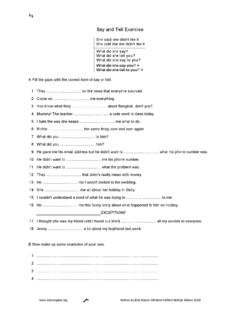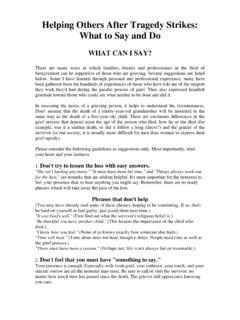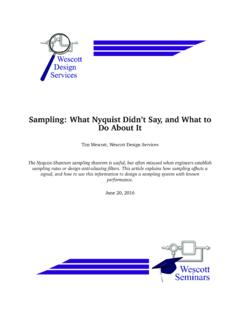Transcription of Seven Questions Jesus Asked “What do you want …
1 -1- Seven Questions Jesus Asked What do you want me to do for you? July 6/7, 2013 Digging Deeper ( Questions are on the last page) Seven Questions Jesus Asked : What do you want me to do for you? Written by: Robert Ismon Brown Background Notes Key Scripture Text(s): Mark 10:46-52; John 1:35-42 Introduction to the Series Depending on how you count them, there are between two and three hundred Questions Asked by Jesus in the Gospels. Many of these are multiple occurrences, taking into account the four different writers, so the numbers are really less. Still, the number is impressive, as is the fact that Jesus seems only to answer directly three of them, by some accounts.
2 As a rabbi, Jesus was expected to ask Questions . Commonly, Questions from students were met by Questions from their rabbis. Answer a question with a question ! It made for endless conversation, facet-turning, and fresh perspectives. The great issues of the day could hardly find singular answers. In fact, the orientation of Jewish education didn t deal so much in answers as in persons who gave answers. Jews have always known that God s ways are higher than ours, as are His thoughts (Isaiah 55:9). The biblical writers refused to settle for immediate solutions to thick Questions , and so they persisted in asking them. Perhaps the one question that falls off our radar (because it s not in the Gospels) comes in the book of Acts where Jesus appears to Saul of Tarsus: 4 He fell to the ground and heard a voice saying to him, "Saul, Saul, why do you persecute me?
3 " 5 He Asked , "Who are you, Lord?" The reply came, "I am Jesus , whom you are persecuting. 6 But get up and enter the city, and you will be told what you are to do" (Acts 9:4-6). The double address underscores the urgency of the question , forcing Saul to ask the identity of the voice he hears within the blinding light of the vision. There really is no answer that satisfies the question , nor does Jesus expect one. What he wants from Saul is a life-changing decision to obey the instructions he will soon receive. Invariably the Questions of Jesus require actions not answers; decisions not debate. When Jesus asks, he unnerves, realigns, transforms, and subverts all the old assumptions and loyalties.
4 Perhaps we ve come to think that Jesus is the man with all the answers. It s a bit like the bumper sticker I saw many years ago that read, Jesus is the Answer, but what are the Questions ? To which we might well reply, Jesus is the question also. What unsettled Jesus original audiences that were usually populated with experts is that he challenged their claim to have all the answers. Like us, they struggled with the notion of mystery and the truth about the sub-text of the world and about the subterranean level of meaning. Jesus Questions are more like invitations to attend a banquet where every serving unlocks some new flavor of truth, and where nobody is in a hurry to leave.
5 Our intention for this new series is to accept the invitation of Jesus . Entering his world of Q&A is risky, yet rewarding; dangerous, yet delightful; puzzling, yet perfecting. We cannot sit at his table without opening our hearts: we can t taste the food with our minds alone. Rainer Maria Rilke, poet and novelist, once wrote: Try to love the Questions themselves. Live the Questions now (from Letters to a Young Poet). For us, the love of Jesus constrains us to be his followers, and if he wants to build our relationship together around the probing Questions of the Gospels, we can do no less than open our hearts to his love, and follow his Questions wherever they lead.
6 Contrary to how Jesus often is portrayed, he does not offer spiritual tips. He does not give us a neat list of ten ways we can be closer to God. He does not provide easy answers. Instead, he asks hard Questions . He is not the ultimate Answer Man, but more like the Great Questioner. In that he is like the Zen master who asks Questions to -2- take us beyond the obvious to something deeper. He is like Socrates, who taught the people simply by asking probing Questions . He is like the prophets, who railed against the ruling authorities and sought justice by asking challenging Questions (Martin Copenhaver, Senior Minister of Wellesley Congregational Church).
7 Douglas Estes, in his scholarly work The Questions of Jesus in John (Leiden: Brill, 2013), shows how far Western thought is from the Gospel in its valuing of Questions . The writer identifies five main types of Jesus - Questions : open, reflective, decisive, responsive, and coercive. In turn, these subdivide into seventeen further categories. Early in his book, Estes acknowledges, Most readers of the gospels read them to see what Jesus will say, not to see what Jesus will ask (The Questions , 2). There is a tendency to pull out the most important statements of Jesus taken out of context and divorced from the Questions that engendered them.
8 This is due in part to a Western bias against Questions even though the intellectual roots of the West go deep into the Q&A methods of Socrates and Plato. Even the Stoic philosopher Chrysippus (280-207 BCE) wrote fourteen books on Questions and the art of questioning! Our interest in this study is not merely to see what the Questions of Jesus are saying, but to see what they are asking. It s tempting immediately to turn the Questions into statements, as if we can t stand the open-endedness of the Questions ! The power of Jesus Questions appear in the narrative material (the stories) found in the Gospels. Place a question in the middle of a story and you break up monotony, add dimension, and persuade the audience.
9 Just when the audience thinks it has Jesus figured out, he raises a question and all bets are off. Questions gives new life to a conversation. Much like a grain of sand that irritates the tissue (mantle) of an oyster and produces a pearl, so are the Questions of Jesus . Ironically the oyster reacts to the sand as an invader a foreign substance and so covers up the irritant with layers of the same material (nacre) that originally created its shell. The result: a pearl! Jesus knew that his Questions irritated his audience, and yet his intention was not to put them off but to engage them by drawing out of them the most fundamental matter of their human selves.
10 Truth that arises from his Questions is the pearl of great price given us by Jesus . Unless the Questions annoy, disorient, intrude, and subvert, they probably won t accomplish much. The more irritating is the question , the more beautiful, like the pearl, is the resulting truth. And so our series is rightly a study in the fine art of being irritated by Jesus ! Once thrown off center, once disoriented, once left uncertain, we become vulnerable to the deeper truth Jesus brings to us. The process is neither easy nor pain-free. Questions the kind Jesus proposes leaves the world forever changed, with much of it in our rear-view mirrors.







